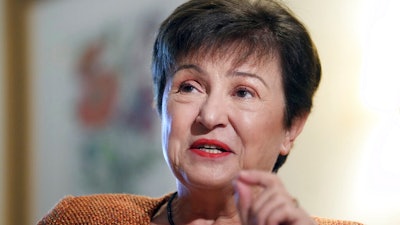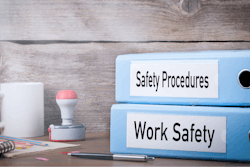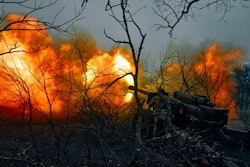
BERLIN (AP) — It is time for China to move away from massive lockdowns and toward a more targeted approach to COVID-19, the head of the International Monetary Fund said days after widespread protests broke out, a change that would ease the impact to a world economy already struggling with high inflation, an energy crisis and disrupted food supply.
IMF Managing Director Kristalina Georgieva urged a “recalibration” of China's tough “zero-COVID" approach aimed at isolating every case “exactly because of the impact it has on both people and on the economy.”
Georgieva made the comments in a wide-ranging interview Tuesday with The Associated Press in which she also cautioned it is too early for the U.S. Federal Reserve to back off on its interest rate increases and held out hope that an energy crisis driven by Russia's war in Ukraine will speed the push into renewables in Europe. She also called increasing hunger in developing countries “the world's most significant solvable problem.”
In China, protests erupted over the weekend in several mainland cities and Hong Kong in the biggest show of public dissent in decades. Authorities have eased some controls but have showed no sign of backing off their larger strategy that has confined millions of people to their homes for months at a time.
“We see the importance of moving away from massive lockdowns, being very targeted in restrictions,” Georgieva said Tuesday in Berlin. “So that targeting allows to contain the spread of COVID without significant economic costs."
Georgieva also urged China to look at vaccination policies and focus on vaccinating the “most vulnerable people.”
A low rate of vaccinations among the elderly is a major reason Beijing has resorted to lockdowns, while the emergence of more-contagious variants has put increasing stress on the effort to prevent any spread.
Lockdowns have slowed everything from travel to retail traffic to car sales in the world's second-largest economy. Georgieva urged it “to adjust the overall approach to how China assesses supply chain functioning with an eye on the spillover impact it has on the rest of the world.”
The Washington-based IMF expected the Chinese economy to grow only 3.2% this year, below the global average for the year, a rare occurrence.
The Communist Party has taken steps in the direction Georgieva recommends, switching to isolating buildings or neighborhoods with infections instead of whole cities and made other changes it says are aimed at reducing the human and economic cost. But a spike in infections since October has prompted local authorities who are facing pressure from above to impose quarantines and other restrictions that residents say are too extreme.
Asked about criticism of a crackdown on protests, a Chinese Foreign Ministry spokesman defended Beijing’s anti-virus strategy and said the public’s legal rights were protected by law.
The government is trying to “provide maximum protection to people’s lives and health while minimizing the COVID impact on social and economic development,” Zhao Lijian said.
While China's policy ripples out worldwide, Georgieva said the greatest risk facing the global economy is high inflation that requires central banks to raise interest rates, making credit more expensive for consumers and businesses. Coupled with that is the need for governments to take care of the most vulnerable people without undermining central bank efforts with excess spending.
“Policymakers are faced with the very difficult time in the year ahead,” she said. “They have to be disciplined in the fight against inflation. Why? Because inflation undermines the foundation for growth, and it hurts the poor people the most.”
Asked if the U.S. Federal Reserve should pause interest rate increases that are strengthening the dollar and putting pressure on poorer countries, Georgieva said that “the Fed has no option but to stay the course" until inflation credibly declines.
“They owe it to the U.S. economy, they owe it to the world economy, because what happens in the United States if inflation does not get under control can have also spillover impacts for the rest of the world,” the Bulgarian IMF chief said.
Inflation data is still too high in the U.S. and Europe and “the data at this point says: too early to step back,” Georgieva said.
She warned that international tensions between the China and the West and between Russia and the West threatened to restrict trade and its beneficial effect on economic growth and prosperity. She added that while there are concerns about supply chains disrupted by the pandemic, “we have to work harder on finding a way to counter these protectionist instincts” while being honest about supply concerns.
Georgieva said the world was already seeing signs of increased hunger before Russia's invasion of Ukraine disrupted grain supplies to Africa and the Middle East. More investment in resilient agriculture and support for small farmers as well as efforts to reduce food waste would be part of the solution, she said.
“We have to admit in the wealthiest societies, in the wealthier families, that we waste food on a daily basis, even in quantities that are sufficient to feed the rest of the world," she said. “Hunger is the world’s most significant solvable problem."
Yet hunger has been increasing in recent years.
The world needs "a focus on food security in a comprehensive way that reduces waste, increases productivity and most importantly, focuses more attention on small-scale farming, where a great deal of livelihoods of people, especially in developing countries like that, would go a long way to bring this solvable problem finally to an end,” Georgieva said.
Russia's war also created an energy crisis after Moscow cut off most natural gas supplies to Europe as Western allies supported war-torn Ukraine. The resulting high energy prices have created an opportunity to “accelerate the transition to low-carbon energy supplies" through incentives for green investments.






















